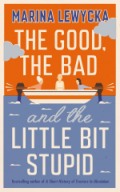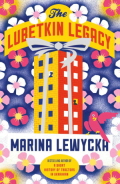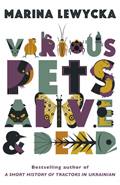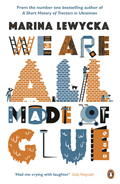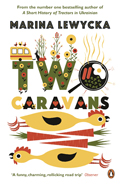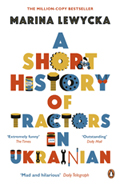Interviews
Guardian interview about The Lubetkin Legacy.
Guardian Interview - please note the sub-editor chopped out the crucial bit in this interview that said it was the PREVIOUS bookthat was rejected 36 times - and is still unpublished!



Independent One-minute Interview


In 2008 Two Caravans was shortlisted for the Orwell prize. This is an interview I did with Jean Seaton, Chair of the Orwell Prize Committee

![]()
INTERVIEW WITH BENEDICT PORTER, SHANGHAI CITY WEEKEND
6 FEB 2009
BP![]() At what point did you feel your story needed to be written? Why were you compelled to write it down?
At what point did you feel your story needed to be written? Why were you compelled to write it down?
ML![]() Ever since I was a little girl, my mother had told me stories about her childhood, and the story of how
they left Ukraine and came to England, and I always knew I would write it down. Before she died I made a tape with her, thinking that it
would be the basis of a book one day. But when I came to write it up, I realised that I didn't really have enough material for a novel, and
that I was going to have to invent things. That was frightening at first, and then it was really liberating - it meant that what started off as
memoir became a novel.
Ever since I was a little girl, my mother had told me stories about her childhood, and the story of how
they left Ukraine and came to England, and I always knew I would write it down. Before she died I made a tape with her, thinking that it
would be the basis of a book one day. But when I came to write it up, I realised that I didn't really have enough material for a novel, and
that I was going to have to invent things. That was frightening at first, and then it was really liberating - it meant that what started off as
memoir became a novel.
BP![]() How long have you had a book 'inside' you? Why do you think it was until "later" (and I use this term very
loosely) in life that you decided to write?
How long have you had a book 'inside' you? Why do you think it was until "later" (and I use this term very
loosely) in life that you decided to write?
ML![]() Actually, I have been writing since I was four years old, which is when I wrote my first poem (it was about rabbits).
I just had many many, years of failure before I stumbled into success.
Actually, I have been writing since I was four years old, which is when I wrote my first poem (it was about rabbits).
I just had many many, years of failure before I stumbled into success.
BP![]() Have you always aspired to be an author?
Have you always aspired to be an author?
ML![]() Yes I have, though my first love was poetry. When I was little, I loved the sound of it - the rhymes and
rhythms seemed like magic spells to me, and I aspired to be a poet. But I also wrote plays for my dolls to act out - they were often rather
horrid and bloodthirsty - and I wrote stories too.
Yes I have, though my first love was poetry. When I was little, I loved the sound of it - the rhymes and
rhythms seemed like magic spells to me, and I aspired to be a poet. But I also wrote plays for my dolls to act out - they were often rather
horrid and bloodthirsty - and I wrote stories too.
BP![]() How long did it take you to write your book?
How long did it take you to write your book?
ML![]() With the first book, it took me about six years on and off, working mainly in the evenings, to get about
half way through, then two years working more consistently to finish it off. And it took two years really flat out, doing little else, to write
the second book.
With the first book, it took me about six years on and off, working mainly in the evenings, to get about
half way through, then two years working more consistently to finish it off. And it took two years really flat out, doing little else, to write
the second book.
BP![]() You and your parents throughout the 20th Century have seen so much hardship and war but in the midst
of all that you must have also seen the strength and beauty of the human spirit. Do you feel that it was only until you reached a certain
maturity that you were able to fully understand the ramifications of what you lived through and commit it to paper?
You and your parents throughout the 20th Century have seen so much hardship and war but in the midst
of all that you must have also seen the strength and beauty of the human spirit. Do you feel that it was only until you reached a certain
maturity that you were able to fully understand the ramifications of what you lived through and commit it to paper?
ML![]() I think there's a lot to be said for maturity, though I'm not sure one actually gets wiser - I think as
I grew older, I became more aware of human foibles as well as the beauty of the human spirit, and I found that I could laugh at things which
would have made me angry or upset when I was younger - including at myself and my own family. The ability to laugh is very important - it sees
us through hard times and keep us in touch with our essential humanity. Comedy is quite a serious business!
I think there's a lot to be said for maturity, though I'm not sure one actually gets wiser - I think as
I grew older, I became more aware of human foibles as well as the beauty of the human spirit, and I found that I could laugh at things which
would have made me angry or upset when I was younger - including at myself and my own family. The ability to laugh is very important - it sees
us through hard times and keep us in touch with our essential humanity. Comedy is quite a serious business!
BP![]() Apart from being too busy to write (because of business or family, etc), do you feel that you could have
written your books when you were younger? Or are the books resultative and conducive to certain experiences and time?
Apart from being too busy to write (because of business or family, etc), do you feel that you could have
written your books when you were younger? Or are the books resultative and conducive to certain experiences and time?
ML![]() The books I wrote when I was younger, which were never published, were much more serious and angst-ridden.
I'm so glad I wasn't published then, because I would have ended up as quite a different sort of writer - much less enjoyable. When you're young,
you think you know everything; as you get older, you become more and more aware of the things you don't know, and that encourages a kind of humility;
as a result you are much more forgiving of other people's weaknesses. Bob Dylan has a line in one of his songs which I think applies to many people
including me - "Oh, I was so much older then. I'm younger than that now."
The books I wrote when I was younger, which were never published, were much more serious and angst-ridden.
I'm so glad I wasn't published then, because I would have ended up as quite a different sort of writer - much less enjoyable. When you're young,
you think you know everything; as you get older, you become more and more aware of the things you don't know, and that encourages a kind of humility;
as a result you are much more forgiving of other people's weaknesses. Bob Dylan has a line in one of his songs which I think applies to many people
including me - "Oh, I was so much older then. I'm younger than that now."
BP![]() Was the writing experience a gush of information and feeling, knowing that the publishers would get
their knives and scissors out later, or did you closely edit it and try to refine it as you wrote?
Was the writing experience a gush of information and feeling, knowing that the publishers would get
their knives and scissors out later, or did you closely edit it and try to refine it as you wrote?
ML![]() I find great pleasure in writing - there's usually nothing I'd rather be doing - and rewriting and
polishing is an even greater pleasure, because you've done the hard graft of getting the story down, and now you can have fun developing
and refining the ideas and the characters.
I find great pleasure in writing - there's usually nothing I'd rather be doing - and rewriting and
polishing is an even greater pleasure, because you've done the hard graft of getting the story down, and now you can have fun developing
and refining the ideas and the characters.
BP![]() Can you please describe the editing process you experienced with the publisher once they agreed to pick
your book up? How long did it take?
Can you please describe the editing process you experienced with the publisher once they agreed to pick
your book up? How long did it take?
ML![]() With A Short History of Tractors in Ukrainian there was very little editing. This is
because I wrote the book as part of an MA in Creative Writing, so a lot of the hard
'editing' work had already been done by the tutors. With my second book, Two Caravans, there was a lot of editing. Really, it was quite a crazy idea
trying to tell a story through nine different voices - one of them a dog. So it was quite hard to get it right. The book I'm working on now -
We Are All Made of Glue - is quite difficult for different reasons. With my first book, I had all the time in the world, so I had plenty of
opportunities to put the book away for a month or two and then look at it with fresh eyes. With the two subsequent books, I didn't really have that
luxury, so it was helpful to have someone else to point out what wasn't working and needed attention. The latest book has a mystery plot at the heart of it,
so it's particularly difficult to approach it freshly once you know the secret.
With A Short History of Tractors in Ukrainian there was very little editing. This is
because I wrote the book as part of an MA in Creative Writing, so a lot of the hard
'editing' work had already been done by the tutors. With my second book, Two Caravans, there was a lot of editing. Really, it was quite a crazy idea
trying to tell a story through nine different voices - one of them a dog. So it was quite hard to get it right. The book I'm working on now -
We Are All Made of Glue - is quite difficult for different reasons. With my first book, I had all the time in the world, so I had plenty of
opportunities to put the book away for a month or two and then look at it with fresh eyes. With the two subsequent books, I didn't really have that
luxury, so it was helpful to have someone else to point out what wasn't working and needed attention. The latest book has a mystery plot at the heart of it,
so it's particularly difficult to approach it freshly once you know the secret.
BP![]() How long does it take?
How long does it take?
ML![]() Well, there isn't really a set time, because the moment I've sent
of a draft I start editing, changing and revising again. It probably drives my editor mad, but she's very nice about it! There's about six months between
my handing in what I think is a final draft (though it's never really final) before publication, but that includes typesetting and printing. I guess the
editing and proofing is about three months, though I always push it to the limit.
Well, there isn't really a set time, because the moment I've sent
of a draft I start editing, changing and revising again. It probably drives my editor mad, but she's very nice about it! There's about six months between
my handing in what I think is a final draft (though it's never really final) before publication, but that includes typesetting and printing. I guess the
editing and proofing is about three months, though I always push it to the limit.
BP![]() How long did the acceptance period take? What were the negotiations like?
How long did the acceptance period take? What were the negotiations like?
ML![]() You know, I have a collection of thirty six rejection slips for my previous still-unpublished novel. With the Tractor
novel, the acceptance period took about a weekend. As I said, I wrote the book as part of an MA in creative writing, and it just so happened that the external
examiner was a literary agent. So this time I didn't have to go through the same heartbreaking and humiliating process - he read the book and contacted me to
ask me whether I wanted an agent. Naturally I said yes! He did the deal with Penguin over a weekend. I was very disappointed to hear that the advance was
only £25,000. I thought I would get a quarter of a million. You have to be very young and very beautiful to get an advance like that, he said.
You know, I have a collection of thirty six rejection slips for my previous still-unpublished novel. With the Tractor
novel, the acceptance period took about a weekend. As I said, I wrote the book as part of an MA in creative writing, and it just so happened that the external
examiner was a literary agent. So this time I didn't have to go through the same heartbreaking and humiliating process - he read the book and contacted me to
ask me whether I wanted an agent. Naturally I said yes! He did the deal with Penguin over a weekend. I was very disappointed to hear that the advance was
only £25,000. I thought I would get a quarter of a million. You have to be very young and very beautiful to get an advance like that, he said.
BP![]() What was it about your book that you think appealed to the publisher, which separated your book from all the others?
What was it about your book that you think appealed to the publisher, which separated your book from all the others?
ML![]() I think the book was very different to anything that was on the market at the time, though there have been a few
more in a similar genre since then. The main difference is that it was funny, and I think there was a sort of directness about it that appealed
to people. I hadn't really expected it to be published at all, so I just wrote it to entertain myself and my friends - but it ended up entertaining
millions of people, which is very satisfying.
I think the book was very different to anything that was on the market at the time, though there have been a few
more in a similar genre since then. The main difference is that it was funny, and I think there was a sort of directness about it that appealed
to people. I hadn't really expected it to be published at all, so I just wrote it to entertain myself and my friends - but it ended up entertaining
millions of people, which is very satisfying.
![]()
Again, thanks for your time.
Benedict Porter
![]()

